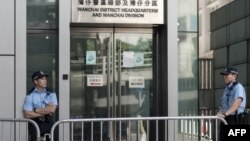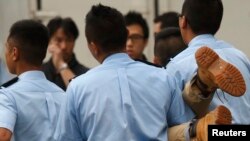Five members of an activist group that organized a massive political rally in Hong Kong earlier this week have been charged with minor offenses.
A Civil Human Rights Front leader said the group's treasurer and another officer were among those taken into custody, along with a driver and two volunteers. Organizers say a half-million people demonstrated in the streets of Hong Kong on July 1 to challenge Beijing's control over local elected officials.
The group posted to its Facebook account on Friday that the members, who are accused of blocking traffic, obstructing police and violating traffic safety, had been freed, but that police had confiscated their phones.
Some 500 people were arrested in what was largely a peaceful protest on a public holiday. The majority were released the following day.
Organizers say 510,000 people attended the protest on the 17th anniversary of the former British colony's return to Chinese governance.
Police put the figure at just under 100,000.
The annual protest took on added significance this year amid a campaign to pressure Beijing to allow Hong Kong residents to elect their leader.
Many of the protesters chanted anti-China slogans and carried signs demanding "real democracy" as they marched from Victoria Park to the financial district.
The protest follows an unofficial referendum in which nearly 800,000 Hong Kong residents voted to be given more control over the nomination of candidates in a 2017 election.
Beijing said it will fulfill its promise to allow the semi-autonomous territory to elect its leader in 2017, but insists only mainland-approved candidates can run.
In the past, mass protests have convinced Beijing to alter its policies toward Hong Kong. In 2003, half a million people showed up for a pro-democracy protest, prompting China to scrap proposed anti-subversion laws. But this time Communist Party leaders appear to be standing firm.
The party last month issued a White Paper emphasizing its "comprehensive jurisdiction" over Hong Kong, which it stressed did not enjoy "full autonomy."
Hong Kong residents enjoy more civil and political rights than their counterparts on the mainland due to Beijing's 1997 agreement with Britain.
But discontent with perceived Chinese interference in Hong Kong is rising and a heavy-handed response by the mainland could trigger more protests.
Occupy Central, a coalition of protest groups, has threatened to shut down the city's financial district later this year if its demands for electoral reforms are not met.
Some information for this report was provided by AP and Reuters.














